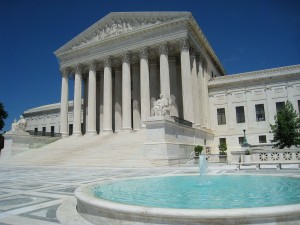Experienced Federal Crime Attorney: Specialist Defense in Federal Crime Instances
Experienced Federal Crime Attorney: Specialist Defense in Federal Crime Instances
Blog Article
Demystifying the Process of Federal Appeals: What You Need to Know
Browsing the detailed world of government appeals can frequently appear like going across undiscovered waters for those unfamiliar with the process. Understanding the nuances of appellate court jurisdiction, the ins and outs of submitting a notification of allure, presenting a compelling brief, and making a convincing oral disagreement are vital components that can considerably affect the result of a case. By untangling the layers of intricacy bordering federal appeals, individuals can gain a clearer understanding right into the devices that control this essential phase of the lawful system.
Recognizing Federal Appeals Refine
Looking into the elaborate realm of the federal allures procedure reveals a organized and methodical trip with the judicial system. Federal charms work as an essential system for examining decisions made by lower courts. Recognizing this procedure is necessary for any individual included in legal process at the government level.
The procedure normally begins with a celebration dissatisfied with a reduced court's judgment filing a notification of charm. This sets off a review by a greater court, where a panel of judges assesses the lawful arguments offered by both celebrations. Briefs detailing the legal thinking behind each celebration's position are sent, and oral debates may be heard to make clear complicated issues.
The appellate court's choice is based on a thorough examination of the reduced court's process and the disagreements provided. When the appellate court reaches a decision, it can attest, turn around, remand, or customize the lower court's ruling, giving quality and finality to the lawful dispute.
Appellate Court Jurisdiction Clarified
Appellate court territory refers to the scope of situations that a particular appellate court has the power to assess and choose upon. Unlike trial courts that hear instances for the very first time, appellate courts are restricted to evaluating choices made by reduced courts.
Appellate courts have jurisdiction over particular kinds of situations, typically those including lawful errors, step-by-step issues, or concerns of regulation instead of accurate disputes. The jurisdiction of appellate courts is generally laid out in statutes and legislations that control the court system. Understanding appellate court jurisdiction is critical for parties associated with the allures process as it figures out whether an instance is eligible for review and the degree to which the appellate court can interfere in the reduced court's decision.
Filing a Notification of Allure
The initial step in beginning the government allures procedure involves filing a Notice of Charm with the proper appellate court. This crucial file officially informs the court and the various other events included in the case that the appealing party intends to seek an evaluation of the lower court's decision. Filing a Notice of Charm is a rigorous procedural requirement that sets the appellate process in motion.
When preparing the Notice of Appeal, it is necessary to make sure conformity with the certain policies and standards of the appropriate appellate court. federal crime attorney. The record needs to commonly consist of details such as the instance name, the reduced court's name, the date of the judgment being appealed, and a concise statement indicating the premises for the allure

Briefing and Dental Argument
In the appellate procedure, offering composed briefs and taking part in oral debates play critical duties in advocating for the appealing celebration's placement before the appellate court. Briefs are detailed legal files that lay out the parties' disagreements, lawful authorities, and evaluation supporting their placements. These written entries give the court with a comprehensive understanding of the truths of the instance, the relevant legislation, and why the appealing event thinks the lower court's decision must be rescinded.
Following the submission and evaluation of the briefs, dental debates offer the celebrations a possibility to more clarify their positions, deal with any type of concerns the appellate courts might have, and emphasize key points from their composed briefs. Oral disagreements are an opportunity for the lawyers to encourage the courts via spoken advocacy and responses to inquiries from the bench.
Both the composed briefs and oral disagreements are vital parts of the appellate procedure, permitting events to offer their instance extensively and compellingly prior to the appellate court. - federal crime lawyer
Obtaining the Appellate Court Choice
The appellate court's choice is usually delivered in a composed format and outlines the court's verdicts on the lawful concerns offered, the reasoning behind their decision, and the judgment made. The time structure for receiving the appellate court's choice can differ, but courts aim to give timely resolutions. Whether the appellate court verifies, turns around, or remands the lower court's decision, recognizing the implications of the ruling is crucial for all parties included in the appellate procedure.
Conclusion
Comprehending the appellate court jurisdiction, filing a notice of appeal, preparing briefs, and presenting oral arguments are all important components of this process. Ultimately, receiving the appellate court decision can provide quality and resolution to legal disputes.
As we progress from understanding the government allures procedure to exploring the ins and outs of appellate court jurisdiction, an essential aspect comes to light regarding the authority and limits of these greater courts in the lawful landscape. Appellate court jurisdiction refers to the scope of cases that a certain appellate court has the power to assess and make a decision upon. Unlike trial courts that hear instances for the very first time, appellate courts are limited to reviewing choices made by reduced courts. Understanding appellate court jurisdiction is critical for events included in the appeals procedure as it figures out whether a case is qualified for review and the level to which the appellate court can interfere in the lower court's choice.

Report this page